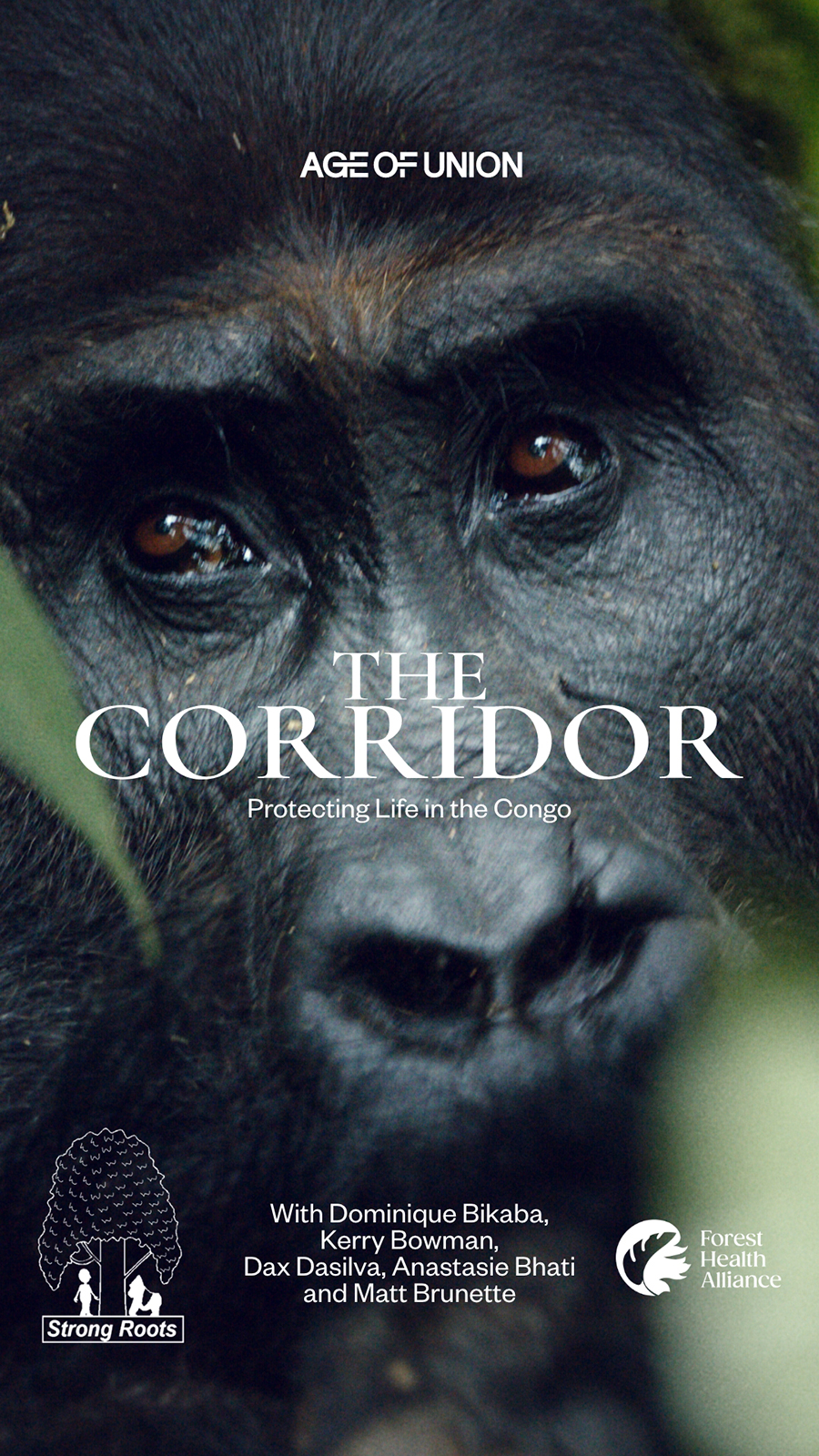‘The Corridor’: New Doc Spotlights “Harmonious Synergy” Between Humans and Endangered Gorillas in the Congo Basin Rainforest

Photo: Mark Lamy
It’s no secret that the Earth is in a state of environmental emergency. In just the last few weeks alone experts warned about ice shelves in west Antarctica melting at a dangerous pace, climate change causing an abnormally warm winter, the Amazon rainforest — already in grave condition — being threatened by a one-two punch of severe drought and deforestation and 21 endangered species of animals and plants going extinct.
It can all feel dire and overwhelming, but there are scores of scientists, activists and everyday folks doing their best to find solutions to combat the effects of climate change and protect the plants and animals who share the planet with us.
One of those people is Dax Dasilva, a Vancouver-born entrepreneur, philanthropist and author who Forbes called “one of the most passionate leaders” and someone “whose entrepreneurial success was built on the premise of inclusivity and diversity.”
Dasilva, 47, founded the hugely successful Montreal-based e-commerce company Lightspeed in 2005, serving as CEO until stepping down from the post in 2022. Though he transitioned to the role of executive chairman of Lightspeed, he also launched a new venture, Age of Union, an environmental alliance that supports 10 conservation projects around the world. The initiatives protect everything from forests to marine wildlife, help communities achieve food sovereignty through farming and provide educational programs and tools.

“My journey in this realm began during my teenage years, when I took a stand against the old-growth forest logging in Clayoquot Sound,” Dasilva told Zoomer during a recent interview. “I always envisioned that one day, when I had the necessary resources and experience, I would dedicate myself to the cause of conservation. Age of Union serves as the vessel to transform this aspiration into reality.”
One of Age of Union’s most powerful tools is its ability to produce and co-produce films about environmental causes, like the 2022 documentary Wildcat, which won the award for Outstanding Documentary at the 2023 News & Documentary Emmy Awards.
And now, the group’s most recent short film, The Corridor, spotlights two critical and interconnected subjects: an Indigenous community expelled from its ancestral lands in the Congo Basin rainforest and the critically endangered eastern lowland gorilla that also calls the rainforest home.
The Indigenous community, which was expelled from its land 30 years ago, is attempting to reclaim its home in the rainforest that members have protected for generations and also secure land titles so a wildlife corridor can be created for the endangered gorilla. It represents what Dasilva calls “a harmonious synergy where the welfare of both humanity and wildlife are intricately intertwined, proving that conservation, at its core, is as much about people as it is about the animals we strive to protect.”
The Corridor can be viewed in full for free on YouTube (and in the video below).
Dasilva spoke with Zoomer about The Corridor and about the power of film and social media to affect positive environmental change.
MIKE CRISOLAGO: You were on the ground in the Congo Basin rainforest to witness firsthand the issues spotlighted in The Corridor. Tell me about that experience.
DAX DASILVA: What became abundantly clear was that safeguarding endangered species like the eastern lowland gorillas isn’t just about putting up fences and creating sanctuaries; it’s also about uplifting and empowering the surrounding communities to become unwavering allies of nature. As I witnessed these projects in action, a profound revelation unfolded. It was evident that by enhancing the lives of local and Indigenous Congolese people, these initiatives weren’t just contributing to their immediate well-being, but also fortifying the future of those species teetering on the brink of extinction.
MC: The Congo Basin rainforest is described in the film as “the second lung of the Earth,” while the World Wildlife Fund calls it “one of the most important wilderness areas left on Earth.” Yet it doesn’t get the mainstream attention that many other areas of the world get when discussing environmental protections. Why do you think that is and how do you hope that might shift in the coming years?
DD: Part of the reason there hasn’t been much media attention surrounding this is because, unlike some of its rainforest counterparts, such as the Amazon, Indonesian or Madagascar rainforests, the Congo Basin hasn’t witnessed the same level of industrial or mechanized exploitation of its precious natural resources — think forestry, mining or large-scale industrial agriculture. This discrepancy presents an opportunity for us to safeguard vast portions of the still-intact Congo Basin rainforest and formulate strategies that can serve as sustainable, long-term solutions for the benefit of the local and Indigenous Congolese communities who call these lush forests home.

MC: Many of Age of Union’s films are available on YouTube. What is the advantage of using the combination of short films and social media to raise awareness of these issues?
DD: I’ve had the privilege of witnessing firsthand the vital importance of our planet’s mega-diverse environments. These awe-inspiring, yet often remote, landscapes home to an astonishing array of species. It became increasingly clear to me that we needed innovative ways to draw attention to the challenges these environments face and highlight the real, on-the-ground opportunities to save them.
In the early stages of the Age of Union initiative, we discovered that the power of short films and social media is unrivalled in their ability to capture the public’s attention. These mediums have proven to be effective tools for raising awareness, fostering positive change and forging strong alliances dedicated to safeguarding these natural treasures. An example of this is with our Caught documentary, in partnership with Sea Shepherd, which exposes the slaughter of dolphins off the French Atlantic coast as part of non-selective and dangerous fishing methods while also documenting the harmful and illegal practice of discarding fish at sea by a super trawler in the Bay of Biscay … The French government recently banned fishing along parts of the Atlantic coast for a set time period. The decision, announced on March 20 of this year, followed a shocking report from Pelagis, an oceanographic observatory, which revealed that 910 dolphins had washed up on French shores since the start of winter. This really speaks to the impact a short film can make.
MC: In making these films, how important is it for you to visit the locales you’re highlighting?
DD: I can’t stress enough just how crucial it is to witness firsthand the local grassroots conservation efforts. I’ve visited eight out of 10 projects on the ground, and from what I’ve seen, it’s abundantly clear that comprehending the full scope of these initiatives goes beyond reading reports or watching documentaries. To truly grasp the impact, one must immerse oneself in the social, economic and political dynamics that underpin these projects and observe how they seamlessly integrate into the broader context. An example of this being The Corridor. It’s only by being on the ground that you can appreciate the local strategies in action and gain insight into what it will genuinely require to protect endangered species while also fostering the well-being of the people who call these areas home.

MC: The Corridor ends on a hopeful note. What message(s) do you hope audiences take from this film?
DD: In this pivotal decade of action, where the urgency for positive environmental change couldn’t be more pressing, I find myself filled with hope as I witness the remarkable impact of local and Indigenous-led conservation projects. These initiatives illuminate a path towards a more harmonious coexistence with our planet, offering valuable lessons for all of us.
An example of this is the Forest Land Title project, spearheaded by Strong Roots Congo. This project is focused on securing land titles for 21 communities. If successful, these titles would create one of the world’s first community-managed wildlife corridors. In 2022, after eight years of working with local communities, land title applications for the corridor were submitted to the Congolese government. It stands as a tangible testament that local insight and buy-in are the new model for finding the big solutions for the planet.
Visit Age of Union’s website for more information about the alliance and their films.
This interview has been edited and condensed.
RELATED: